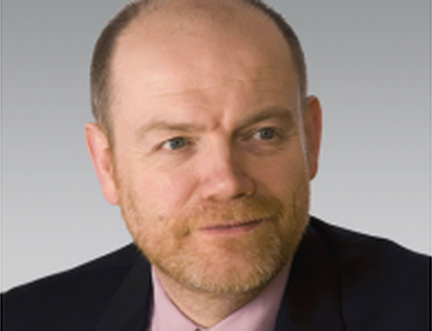More articles Tuesday 30 August 2016 12:25pm
BBC's Former Director Argues that Political Discourse Has Failed

As the former Director General of the BBC and the current Chief Executive of The New York Times Company, Mark Thompson knows more than most about the language deployed by politicians and other public figures. His new book Enough Said deals with what he regards as the failure of language in public life – a loss of trust and authenticity that has led directly, he argues, to an ill-informed vote on Brexit in the UK and to Donald Trump’s improbable proximity to the Presidency of the United States.
“Language is not a by-product of this,” he told the Book Festival. “It sits right in the middle of it. The way politicians speak to us has changed.” Whilst acknowledging that public figures have always played with rhetoric and used linguistic devices to persuade the public of their authenticity, he cited the rise of “anti-politicians” like Trump, Nigel Farage and Beppe Grillo – “a stand-up comedian who now controls virtually every city in Italy” – and statements like Michael Gove’s “The people of this country have had enough of experts” as evidence of a substantial and worrying change. The book is “a sort of detective story in which I’m trying to figure out what’s wrong.”
He explained his concept of “authenticism”, whereby politicians such as Sarah Palin and Boris Johnson – “people who are part of the elite but who find a way to signal that they’re not part of the elite” - have played upon their own supposed quirkiness and spontaneity for political gain. Advertising, he said, has had considerable influence, with simple messages such as Saatchi and Saatchi’s famous 1979 “Labour Isn’t Working” poster and the sly populism of Ronald Reagan’s persona affecting the entirety of the political discourse. “Lessons learned in marketing have been applied everywhere.”
Meanwhile, he said, public understanding of what is really being done in their name and to affect their lives is ever less advanced. “Far too little emphasis has been placed on trying to help the public to understand the context and the background of policy.” He gave the example of “the trade-off” as a day-to-day political reality never given adequate explanation to voters. “When someone wants to do something there’s often a cost. Politicians are really bad at sharing that with the public. Ordinary citizens can take bad news. They can take much more complexity than the politicians trust them with.”
As to the beleaguered BBC, which he ran from 2004 until 2012, he pointed out its value as being tied up with the fact that “it’s so big that everyone bumps into it. You can’t help but hear opinions that differ from your own. One of the ways you glue a country together is to force everyone to get a sense of how everyone else lives.” The fragmentation and personalisation of media potentially mitigates against this variety of perspectives.
“The BBC is one of few cultural institutions that works across the UK. If you lose that, the relationships between the different people who live on these islands will be impoverished.” He defended the corporation’s “structured professional news reporting; investigative journalism – you can’t replace that with an army of tiny digital start-ups. A good ecology is where you’ve got immense plurality, but you’ve still got some strong islands of professional journalism with a commitment to truth and accountability. They may not be perfect, or perfectly impartial – but do you think the market is going to replace them? Really?” Enough said? Almost certainly not, but a provocation has certainly been launched.
- 2026 Festival:
- 15-30 August
Latest News
 Major new partnership with Celtic Connections
Major new partnership with Celtic Connections



